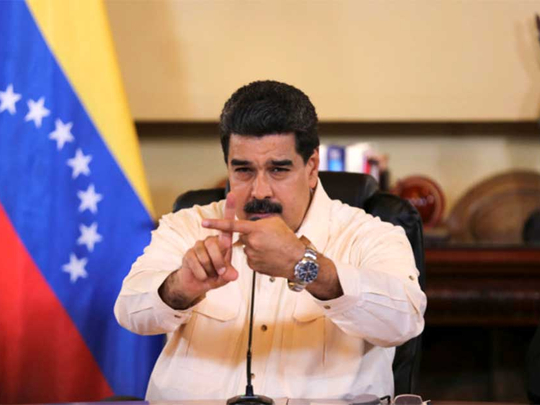
After months of clashes with security forces, street demonstrations in Venezuela have calmed down, but the economic and political crises are far from over. The fraudulently elected National Assembly is drafting a new Constitution that will subordinate the judicial system and legislative bodies to the executive branch. The result will be a new dictatorship in Latin America — the first in decades.
Having grabbed virtually total power to govern at will, President Nicolas Maduro has wasted no time in jailing political opponents, resorting to torture and repression against students, and silencing the remaining critical news media outlets. Despite a humanitarian disaster leading his country’s citizens to lose on average up to 10 per cent of their weight, to be told to eat pet rabbits and to flee abroad by the hundreds of thousands, Hugo Chavez’s successor refuses to step down.
Other countries in the region and the internal opposition must intensify their efforts to find a way out of the chaos. Talks in the Dominican Republic between officials from Maduro’s government and its opponents will not succeed by themselves. Recently, United States President Donald Trump hosted a dinner for the presidents of Brazil, Colombia and Panama and the vice-president of Argentina, at which, they agreed to continue working together to resolve Venezuela’s problems. They might achieve something, but only if another country is brought into the equation: Cuba.
Given Trump’s animosity towards the Cuban regime in his United Nations speech last Tuesday, when he said Washington will not lift sanctions on Havana until it makes reforms, it may seem an unlikely partnership. But both countries have real incentives to work together: Only the Cubans can ease Maduro and his henchmen from power, and only United States’ investment, tourism, trade and goodwill can allow Cuba to solve its serious economic problems. If Raul Castro joins in, a deal could be struck, now or when the crisis takes another turn for the worse.
Maduro refuses to step down. While the government has scheduled regional elections for mid-October, Maduro is unwilling to call a presidential election next year, because he knows he will lose. International pressure on Venezuela has increased. Latin American countries have made powerful statements against the regime, and the US has imposed sanctions; the European Union may soon impose economic and visa sanctions.
But these measures alone are unlikely to bring about change in Venezuela, which makes the counterintuitive involvement of Cuba and the US all the more attractive.
Why should Washington and Havana play a role in extricating Venezuela from the mess it is in?
First, Cuba has, on occasion, been helpful in key civil strife negotiations, most recently in Colombia’s peace agreement. Second, the only external power with any real influence in Caracas is Cuba. With more than 40,000 Cuban doctors, teachers and intelligence and security personnel in Venezuela, the Havana government enjoys Maduro’s complete trust. He relies on it for his own security, to influence his allies and to control his rivals and adversaries. In exchange, Cuba is paid in hard currency for the human resources it provides along with subsidised, though decreasing, supplies of crude oil for Cuban consumption as well as for resale at a higher price to other countries.
In short, the Cubans are the only actors in this quagmire who can influence Maduro and persuade him to step aside. The opposition and the US must be persuaded to grant Maduro and his closest cronies safe haven in Havana. This would prompt presidential elections in Venezuela and a reconciliation process with amnesty for all Venezuelans.
Why would Cubans push Maduro to leave? They know that though he has weathered the latest crisis, there are many more to come: debt default, slipping oil production and prices, unrest in the armed forces. Cuba has bet the store on other countries in the past and knows well that the results have not been great.
And Cuba has a huge problem just to its north with no visible solution: Donald Trump. With his election victory, Havana lost all of its contacts in Washington. Trump’s revisions of firmer US president Barack Obama’s executive actions to normalise relations with Havana are more fig leaves for Cuban-American legislators than actual threats to Cuba, but they are achieving a secondary effect: Dissuading US and European businesses from investing in Cuba. Cuba wants American tourists, but it needs certainty and continuity to attract investments that could make its economy grow. Without Trump, that is unlikely.
Is there room for a quid pro quo in all of this? Would Havana help ease out Maduro and facilitate the restoration of Venezuela’s democracy if Trump were to pursue Obama-style normalisation? What if countries like Brazil, Canada, Colombia and Mexico were to replace Maduro’s oil subsidies for a time and the tens of thousands of Cuban foot soldiers in Venezuela were to be guaranteed a gradual and safe return home? It’s hard to say, but everyone would benefit from such a deal, and none of the parties involved would lose excessively.
Venezuela has a lot to gain from a grand bargain including Cuba and the US, but so do Cuba, the US and the rest of Latin America. At the moment, it might seem naive to think that Maduro and his allies would accept a deal in which he leaves power just as he appears to have consolidated it. But sometimes that is the best moment to reach an agreement. Venezuela’s situation is untenable, and the Cubans, who have been around forever, know that. Does Trump?
— New York Times News Service
Jorge G. Castaneda, Mexico’s foreign minister from 2000 to 2003, is a professor at New York University and a board member of Human Rights Watch.










